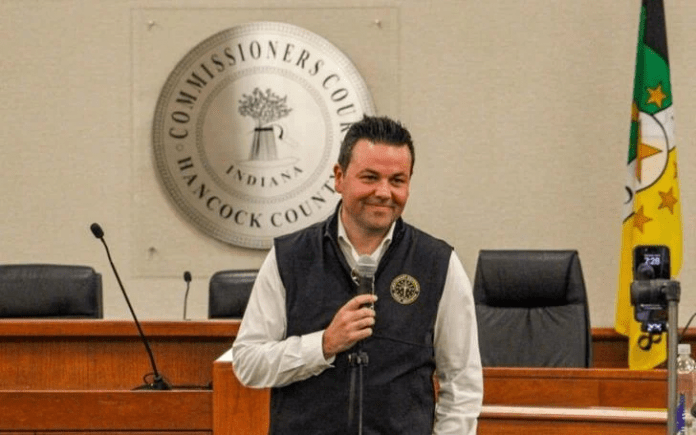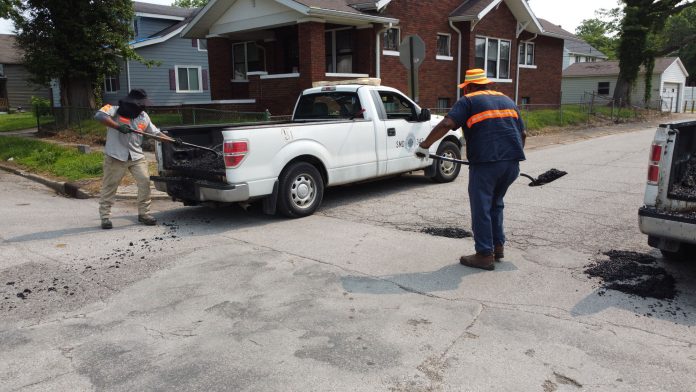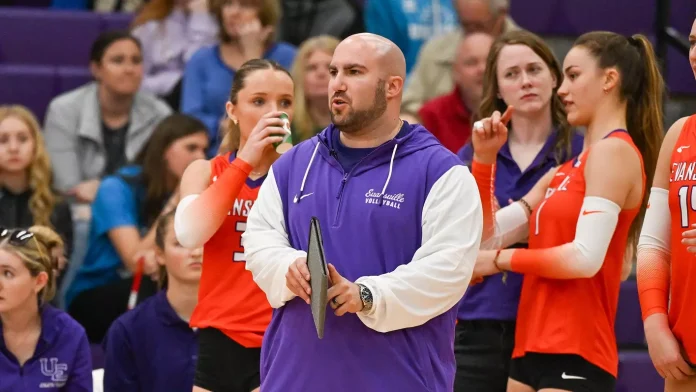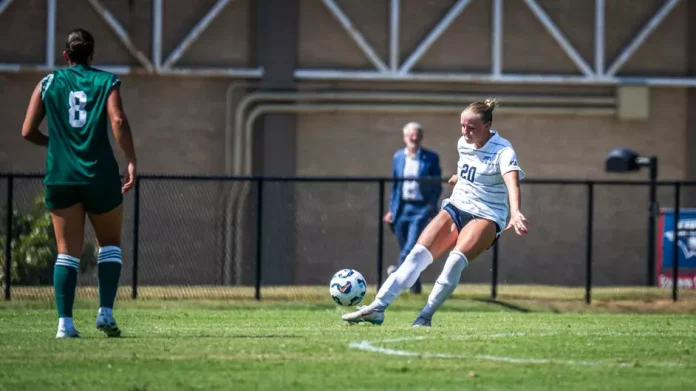- At a closed-door meeting in April, Micah Beckwith and members of what the Indiana lieutenant governor called his Anti-Woke Advisory Committee laid out an aggressive strategy to expand conservative influence in public schools and push back against what the group identified as “woke policy creep.”
The committee detailed plans to launch conservative student clubs, reshape teacher training programs, and identify school districts where diversity and pro-LGBTQ+ policies are in place, according to meeting notes obtained by The Indiana Citizen and verified as authentic by a person familiar with the committee. Many of the discussion topics were aimed at ramping up political pressure on school boards.
Those at the table represented a cross section of Indiana’s conservative movement. Attendees included Indiana Family Institute executive director Ryan McCann and education director Martin Strother. Former Attorney General Curtis Hill—who lost his 2020 renomination bid after his law license was suspended over groping allegations—joined by video, a reminder of his ongoing presence in some GOP circles. Also present was Jay Hart, a Morgan County conservative who unsuccessfully challenged state Senate President Pro Tem Rodric Bray in a 2024 Republican primary.
The only sitting lawmaker in the room was state Sen. Craig Haggard, R-Mooresville. Haggard has since criticized Beckwith’s handling of allegations that around the same time the April meeting took place, staffers in the lieutenant governor’s office viewed a deepfake pornographic video of Haggard’s wife.
Rounding out the group were Fishers photographer Shayre Rivotto; Allie Madden, a Marion County state GOP convention delegate; conservative activist and social-media figure Ken Colbert of Evansville, who attended via video; and someone identified as Valerie Swank.
What isn’t made clear by the meeting notes is how committee members were chosen, whether they have continued meeting and what actions the group has taken since April. Beckwith’s office, the Indiana Family Institute and Haggard did not respond to multiple requests for comment on the meeting.
Hill confirmed his participation in Beckwith’s anti-woke committee in an email, saying the two have had “enjoyed a close professional relationship for several years” and that he offered to help Beckwith.
“The lieutenant governor believes, as do I, that the issue of ‘wokeness’ as characterized by overt political correctness primarily in the area of race and gender has had a harmful impact on the American constitutional standard of ‘equal under the law,’” Hill said.
“I believe very strongly and support diversity as a positive attribute to any outcome. However, when diversity becomes the objective over excellence or inclusion is mandated out of fear, it becomes appropriate for us to examine and restore our first principles to find a true and just result. This advisory committee is an opportunity for the lieutenant governor to gain insight into an issue of growing concern to his constituents and to seek counsel on addressing an issue that has proven very divisive to state and national interests. I look forward to contributing to this dialogue.”
Conservative culture in high schools
According to the meeting notes, the committee formed by Beckwith, a self-identified Christian nationalist, focused on specific steps to launch conservative clubs in schools and target teachers, education colleges, and programs they see as promoting pro-LGBTQ+ content or “leftist ideology.”
Members discussed creating “Conservative Club Kits” with shirts, hats and stickers and developing a youth branding campaign built around the slogan, “It’s Cool to Be Conservative.” The effort would be coordinated with Turning Point USA, a national conservative youth organization founded by right-wing media personality Charlie Kirk.
Attendees identified several potential roadblocks to launching Turning Point USA chapters, including liberal teachers counteracting conservative messages and difficulty finding teachers to sponsor the groups in places like Zionsville.
Beckwith already has a relationship with Turning Point USA. In July, the Noblesville church where he is a pastor, Life Church, hosted Rob McCoy, a senior pastor of a California chapel and representative of Turning Point USA.
In April, Beckwith also visited Purdue University’s Turning Point USA chapter when it hosted Charlie Kirk and posted praise of the event, writing: “Seeing the next generation of bold, courageous leaders rise up to defend faith, family, freedom, and liberty reminds me why I do what I do. These students aren’t backing down—they’re standing up for truth in a world that desperately needs it. Let’s keep fueling the fire of freedom. The American comeback starts with them—and it starts right here in the Heartland.”
Targeting Center Grove, teacher education programs
According to the meeting notes, committee members also raised concerns about teacher preparation programs at Indiana universities, which they accused of embedding DEI and progressive ideology. Recommendations included a statewide audit, requirements for curriculum transparency, and mandates that training emphasize the U.S. Constitution, free-market economics and character education.
The group identified Center Grove Community School Corporation as “Ground Zero for woke policy creep,” pointing to the continuation of DEI and LGBTQ+-inclusive programming despite the area’s conservative reputation.
As a response, group members proposed a quarterly “Woke Radar Report” to track what they consider “problem districts” and to give Beckwith a platform to pressure local school boards. The report, the meeting notes show, would function both as a watchdog tool and a political instrument, spotlighting schools where progressive policies are growing.
Another recommendation included in the meeting notes: “Use Lt. Governor’s bully pulpit to pressure school boards.”
Stacy Conrad, the executive director of communications for Center Grove Community School Corporation, said the school corporation was not aware of the advisory committee nor the contents of the April meeting.
Commenting on behalf of the board, Conrad wrote: “Our corporation’s vision is that all students receive an exceptional educational experience. Our teachers and staff work every day to ensure every student feels welcome and supported in our classrooms.”
The discussion came as Beckwith backed a measure that would shift Indiana to partisan school board elections. Ultimately, lawmakers opted to allow school board candidates to declare their partisan affiliations but did not require it.
Another topic aimed at ramping up political pressure on school boards discussed in the meeting, the notes say, is legislation that would require school boards to sign off on sex-education curriculum. A version of that proposal became law.
Enforcing ‘patriotic and conservative laws’
The group also discussed ways to enforce “patriotic and conservative laws,” the notes show. Among the topics of discussion was an existing state law requiring the display of the American flag at schools and other tax-supported institutions, with the notes claiming that compliance was lacking. Members noted that the law has no teeth and is widely unenforced.
To address this, the committee recommended drafting new legislation that would add financial penalties for schools or institutions that fail to comply, create a 30-day “correction window” before fines take effect, and extend the requirement to include display of the Indiana state flag alongside the U.S. flag.
According to the meeting notes, Hill was tapped to spearhead the effort by drafting legislation for the 2026 session that would add these enforcement provisions and penalties.
Targeting Indiana Youth Group
Committee members also raised concerns about diversity, equity and inclusion and social-emotional learning programs, with the notes claiming that such initiatives were continuing quietly in schools despite recent administrative and legislative changes.
According to the notes, participants alleged that some teachers were still displaying LGBTQ+ flags and classroom décor to signal political leanings, which were described as a way to “push agendas.”
The committee extended its focus beyond classrooms to nonprofit organizations, recommending audits of groups with state-issued specialty license plates to ensure they were in compliance with what they called “anti-DEI executive orders.” The Indianapolis Youth Group, which provides services and support to LGBTQ+ youth, was specifically named for review, with members questioning whether it had received public grants through its BMV plate program.
Indianapolis Youth Group CEO Chris Paulsen said the organization is well within its right to promote its services and viewpoints while adhering to all state and federal regulations governing nonprofits, along with those established by the Indiana BMV for groups with registered license plate designs.
“In the past, we have defended our right to these specialty plates in court against unlawful interference. The funds generated from these plates directly support young people across Indiana—providing food, clothing, and resources for those experiencing homelessness and financial hardship,” Paulsen said. “We believe organizations like IYG are often subjected to disproportionate scrutiny simply because we serve LGBTQ+ youth and young adults, a population that is too often attacked and demonized by politicians. We remain committed to standing firm in our mission and defending the rights of the young people who rely on us.”
Anti-woke legal defense for school boards
To give conservative-majority school boards confidence in rolling back DEI or pro-LGBTQ+ measures, the committee discussed establishing an Indiana Anti-Woke Legal Defense Fund. Members argued that fear of litigation had prevented boards from acting, citing concerns over the high cost of lawsuits if they attempted to eliminate DEI offices or remove LGBTQ+-inclusive materials. They proposed tapping legal assistance from national advocacy groups such as Alliance Defending Freedom and drawing on the Indiana Family Institute for additional policy support.
The committee also raised the possibility of asking Attorney General Todd Rokita’s office to defend districts in certain cases but emphasized that a dedicated legal defense fund would give school boards more certainty and independence to move forward with policy changes. It’s unclear whether any coordination effort was made prior to the meeting with the attorney general’s office.
The meeting concluded with an action checklist assigning tasks to Beckwith’s office and members of the committee, according to the notes.
Tasks assigned to Beckwith’s office included promoting Turning Point USA chapters in high schools, launching the “Cool to be Conservative” youth branding effort, investigating the Indiana Youth Group and similar nonprofits’ funding, auditing teacher education programs, beginning the “Woke Radar Report,” and drafting legislation to allow the removal of disruptive students from classrooms. Hill was assigned to draft the flag enforcement bill, and the Indiana Family Institute was to work on a legal defense partnership.
Beckwith and allies planned strategies to push conservative ideology in schools in April meeting
Braun: Administration saved $38M in first 6 months, cut $72M from future spending
The Indiana Department of Administration has saved Hoosier taxpayers about $37.6 million over its first six months under Gov. Braun’s leadership, his office announced.
The agency, which manages state assets, has also identified about $72.2 million in previously anticipated expenses that it will now “avoid.”
Braun said a pair of efficiency executive orders “are paying off.”
“We’re finding a lot of things in many of the nooks and crannies of our own state government,” he told reporters at a news conference Wednesday.
Contract renegotiations, for example, saved $1.4 million and prevented $37 million in projected spending, Braun continued.
Reforming the state’s approach to procurement — using national price benchmarks and “smarter processes” — saved $2.3 million and cut $31.8 million from future expenditures, according to a news release issued last week.
The state also launched an in-house procurement management dashboard “at no cost” and plans to establish “advanced category and vendor management systems.”
Such moves align with a recent state law that increases upper-level scrutiny of state contracting.
Reassigning vehicles across agencies saved another $2.1 million and “avoid(ed) unnecessary purchases,” the release continued.
The state still pursued additional fleet vehicles, but at a discount.
Braun’s office said it “leverag(ed) utilization data and bulk purchasing” in its pre-tariff bargaining to save $1.4 million and steer clear of future costs. The release asserted that this move “eliminated $37 million in Motor Pool expenses” over the two-year budget cycle and “reclaimed” 50 administrative staff hours.
The administration has also negotiated $240,000 in lease rebates, with a deal “underway” to eliminate $1.2 million in utility costs.

Nearly 400 surplus items were also redistributed, while 705 computers were earmarked for school corporations. Combined with “improved surplus sales processes,” this generated $1.6 million in revenue and an additional $615,000 in cost avoidance for local units of government, according to the release.
Braun touted the state’s improving fiscal outlook but said the push for efficiency was still necessary.
Asked about layoffs and service cuts, he said, “Our agencies, they had grown over time in a way that wasn’t sustainable. … That still needs to occur, because if we are not running state government efficiently and in a sustainable way, we can’t make the investments, whether it’s in public health, whether it’s in education.”
Agency Commissioner Brandon Clifton told reporters that the direct savings would likely be reverted to the General Fund.
“This is just the beginning,” he said of the push to save.
American College of Education Doctoral Graduate Emerges as a Leading Voice on AI in Classrooms
Dr. Nneka J. McGee chose ACE’s low-cost, flexible, online doctoral program for her studies; her doctoral research, which examined how teachers learn about and use artificial intelligence tools, caught the attention of leading institutions and established her as a national leader on the topic of AI in K-12 education.
INDIANAPOLIS, August 27, 2025 (Newswire.com) – Accomplished educator Dr. Nneka J. McGee turned her professional research in artificial intelligence into a doctoral degree at American College of Education (ACE), establishing her as a national leader in implementing AI in K-12 classrooms – just as a new presidential executive order calls for more AI education in K-12 schools.
ACE, founded in 2005 and accredited by the Higher Learning Commission, is a national innovator in providing quality, affordable and online graduate degrees, and is the third-highest conferrer of education master’s degrees in the United States.1
For her doctoral dissertation, McGee conducted original research into K-12 teachers’ experiences learning about AI and attempting to implement it in their classrooms. She completed her program in December 2023 and graduated from ACE in 2024.
She chose to pursue her degree at ACE because of her concerns about the high tuition and student loan debt at most graduate programs. She also wanted the flexibility of online education so she could continue her career – something difficult or impossible if she attended a traditional bricks-and-mortar university.
ACE’s doctoral tuition is under $25,0002 and among the lowest in the United States. It has not raised tuition in eight years3 and the college forgoes federal student loan programs, which helps keep costs low. As a result, McGee was able to graduate from ACE without accruing any student loans.
“That was really a determining factor for me, and ACE also has the accreditation that is necessary,” McGee said. “Because of that and the flexibility of the program, I was able to keep working and, during my program, I rose from director to executive director to chief academic officer.”
When McGee began her research, she was working as a director of advanced academics in a Dallas-area school district and building the framework for launching an AI initiative aimed at helping students learn more about the technology. ChatGPT was still years from becoming a household word, and she realized there were few studies on the use of AI in the United States’ K-12 schools.
“I noticed there is this thing, AI, that is going to transform education, and I thought not enough people are talking about it or looking at the implications. That was the genesis for my research,” McGee said.
Through a questionnaire and follow-up interviews, she gathered information from a slate of K-12 teachers nationwide on their efforts to learn about AI educational tools and to bring them into the classroom.
McGee found that teachers were using AI-powered tools to save time on tasks, and that they saw increased student engagement when AI was incorporated into learning environments. However, teachers also faced significant challenges in attaining those outcomes.
“One of the biggest findings is that teachers don’t have enough access to quality professional development in this space,” she said. While AI is a hot topic of discussion, teachers have limited access to people with enough expertise to implement it. Teachers had to seek out the few options for professional development on their own.
She also found that when teachers did find a way to access AI training, they often faced the challenge of having limited time to pursue the professional development side, let alone implement it in their classrooms.
Doctoral students often face similar challenges as they study and write their dissertations. McGee said ACE’s online classes are more effective than traditional on-campus lectures because “you actually have more time to sit and really process the information, because it is flexible, on your own time, when you’re in the best condition to learn.”
ACE uses a chapter-by-chapter dissertation model, where students work on their dissertation progressively throughout their doctoral program, rather than waiting until the end. In addition, dedicated faculty members guide students through each phase of the dissertation, including topic selection, literature review, research methodology, data analysis and the final defense.
Professors also offered invaluable support when she felt challenged while writing her dissertation. “One of my professors kept checking in on me – he may have noticed it in my emails or responses – and he said, ‘OK, we need to talk like, so call me and let’s talk,'” McGee said. “That call really changed everything. He said, ‘Let’s look at this, how are you feeling, why are you feeling this way?’ And I realized what I needed to do, and that weekend I finished everything up. So it was a pivotal moment.”
The dissertation, now available online, recommends that school districts invest in professional development and resources that promote responsible AI implementation – an idea echoed months later in April’s presidential executive order.
McGee’s work has caught the attention of many organizations developing policies and uses for AI, allowing her to serve as a panelist for the U.S. Department of Education and Carnegie Mellon University. She has also collaborated on projects with Digital Promise and the Stanford Accelerator for Learning at Stanford University. McGee has been in high demand as a keynote or featured speaker on AI in education at multiple conferences.
She credits much of her success to ACE’s program and the quality and personal attention of its faculty. “My dissertation work came out when ChatGPT exploded,” McGee said. “People saw me as a teacher with campus experience, district leadership and administration experience, and I had a doctoral degree. That just wouldn’t have been possible without ACE’s program, and the care and consideration of my teachers.”
ACE President and CEO Geordie Hyland said the college was proud of McGee’s career success.
“Dr. McGee’s commitment to pursuing her doctorate on AI’s role in education is a perfect example of our students’ dedication to learning and mastering the latest advances in their field,” Hyland said. “Students like Dr. McGee are the reason ACE is committed to building programs that teach current, relevant skills, and why we continually refine those programs while relentlessly focusing on keeping our degrees accessible and affordable.”
2This is an estimated value of the cost for tuition and fees. Amounts may vary depending on number of transfer credits applied to the selected program hours, the pace and satisfactory completion of the selected program, receipt of institutional scholarship and/or grant amounts, or adjustments to tuition or fees as described in the Catalog Right to Modify Tuition section. State sales and use tax will apply where required by law.
3Excludes RN to BSN
NATIONAL ASSOCIATION OF SOCIAL WORKERS (INDIANA CHAPTER) ANNOUNCES SOCIAL WORKER OF THE YEAR
INDIANAPOLIS— Today, the Indiana Chapter of the National Association of Social Workers (NASW-IN) announced its 2025 Indiana Social Workers of the Year: Aly Griggs, a licensed clinical social worker (LCSW) from Evansville; and Lisa Kelly, a LCSW from South Bend.
This year, the NASW Indiana Chapter Board was inspired by two exceptional social workers whose achievements at opposite ends of the state both exemplify the profession. This prestigious award is given annually to social workers in the State of Indiana who represent social work core values, including service, social justice, dignity and worth of an individual, importance of human relationships, integrity, and competence.
Kelly, an LCSW specializing in the treatment of anxiety and depression in adults, and in perinatal depression and pregnancy loss at Mental Health Awareness of Michiana (MHAM). She was nominated for her building relationships with everyone from elected officials to faith organizations, to area educational institutions, in what has proven to be a highly beneficial way of bringing together people with shared visions and hopes for our community.
Griggs, an LCSW at New Visions Counseling, was nominated for her exceptional leadership skills and grounded tenacity in advocating for clients and building strong relationships, which she achieves by marrying macro and micro social work within her service to the Evansville community. Additionally, Griggs has positively impacted local drug courts by gaining respect from the judicial and law enforcement communities.
Wheel Tax
Paving the Way: Fixing the Streets We All Use
The City of Evansville will pursue a municipal wheel tax to provide a stable, dedicated source of funding for road and street improvements, responding to long-standing infrastructure challenges and one of the most frequent concerns raised by city residents.
In 2026, Evansville is projected to lose millions of dollars in property tax revenue due to changes in state law (Senate Bill 1, no known as Senate Enrolled Act 1, or SEA1). During the same legislative session, Indiana passed House Enrolled Act 1461 (HEA 1461), requiring cities to adopt the Wheel and Excise Tax in order to qualify for Lane Mile Distribution Dollars – a new, guaranteed state funding stream for local roads.
Why a Wheel Tax, and Why Now?
We’ve all said it, and we hear it every day from Evansville residents: “Fix the roads.”
The truth is, we agree. Evansville’s roads are in rough shape, and our current funding can’t keep up. Right now, we have about $3 million each year for road repairs, plus $1.5 million in state Community Crossings grants. But it takes $12 million annually just to stop our streets from getting worse; if we wanted to get ahead, it would mean allocating $15-$20 million a year for several years to our roads.
That, coupled with the funding changes made by the state legislature, is why the City of Evansville is proposing a municipal wheel tax: a fair, dedicated way to fund the street improvements our community needs.
What Is a Wheel Tax?
A wheel tax is a small annual fee paid when you renew your vehicle registration through the Indiana BMV. It’s based on the type of vehicle and applies only to residents within city limits.
Drivers would pay:
- $15 per year for motorcycles
- $25 per year for cars, SUVs, and standard vehicles
- $35 per year for heavier trucks or trailers
That’s about $2-3 per month—less than the cost of one pothole-related car repair. And the result is estimated at $2.7 million in additional funds to repair Evansville roads.
Where Does the Money Go?
Every dollar stays right here in Evansville.
Funds from the wheel tax go directly into the City’s Road and Street Fund, which is legally restricted to capital improvements such as street resurfacing, sidewalk upgrades, and curb work. They cannot be used for salaries or unrelated city services.
It also positions us to unlock funding from the state, meaning every dollar could go 2-3 times farther.
Recently, Governor Mike Braun told a Conference of Mayors meeting in Elkhart, Indiana that ““Wheel taxes are going to be something you’re going to need to use, because if you don’t do that, it’s going to be hard for the state to partner up in places that need even more for their own roads.”
What Will Get Fixed First?
We’re identifying priority street projects now, including major corridors and streets with long-term maintenance needs.
A full map of planned improvements will be available soon.
How Does Evansville Compare?
Evansville is currently one of the only major cities in Indiana without a wheel tax.
Cities like Fort Wayne, Bloomington, Lafayette, and dozens more already have one in place, using it to maintain and improve their local infrastructure.
This proposal brings us in line with the rest of the state, so we can stay competitive and eligible for critical funding opportunities.
Next Steps
The wheel tax proposal will be introduced to City Council in the coming weeks. If approved, it would go into effect in 2026 and apply during each resident’s BMV registration cycle.
Have Questions? Want to Learn More?
We’re committed to transparency and local accountability. Click below to access:
Volleyball opens season Friday at Butler
Aces play three matches to open 2025 campaign
EVANSVILLE, Ind. – A new era begins this weekend as Zach Weinberg opens his first season at the helm of the University of Evansville volleyball program when the Purple Aces travel to the Butler Big Dawg Kickoff. UE opens against Butler on Friday at 11 a.m. CST before facing Middle Tennessee State and Purdue Fort Wayne on Saturday.
Looking at the Squad
– Evansville returns 11 players from last season and adds seven newcomers to the mix
– Three of Evansville’s primary starters from last season return
– Of the seven newcomers, six will be freshmen in 2025
Evansville’s Seniors
– Kora Ruff and Maddie Hawkins are set to begin their senior campaigns with the Aces
– Ruff completed her junior campaign with an average of 8.94 assists per set, which put her 4th in the MVC
– She was 10th in the league with 0.31 service aces per set while finishing the year 16th with her mark of 3.07 digs/set
– Hawkins wrapped up the 2024 campaign with an average of 0.22 service aces per set putting her in a tie for 30th in the Valley
– She averaged 0.85 digs and 0.22 points per set as a junior
Offensive Force
– Angelica Gonzalez Maltes was Evansville’s top offensive weapon in the final five matches of the 2024 season
– In that time, she averaged 4.63 kills per set while posting a career-high of 21 kills against Belmont and Indiana State
– For the season, she was second on the team with a total of 226 kills while ranking third with her season average of 2.40 kills
– Gonzalez Maltes saw her average rise to 2.62 kills against MVC foes
Finishing Strong
– Ainoah Cruz led the Aces with 4.29 digs per set last season, which put her 7th in the MVC
– Cruz was at her best as the season came to a close as she registered 22 or more digs in three of the final four matches
– In the season finale versus Indiana State, Cruz reset her career mark with 36 digs and averaged an unbelievable 8.71 digs/set over the final two matches
Top Ten
– Evansville’s leading hitter in 2024 was Chloe Cline
– Finishing the season hitting .288, Cline put forth the 9th-best single season performance in school history and ranked 10th in the MVC for the season
– Over the course of the season, Cline averaged 1.44 kills and 0.56 blocks per game
– Her career-high of 11 kills came in the win over Illinois State while she added 10 kills versus Southern Illinois and Murray State
Scouting the Opposition
– Friday’s season opener will see the Aces match up against host Butler inside Hinkle Fieldhouse
– The Bulldogs are coming off a 7-23 campaign last season that saw them go 5-13 in Big East play
– Saturday’s opener will see UE face Middle Tennessee State
– The Blue Raiders were 13-18 last year but improved during the Conference USA portion of the schedule where they went 9-9
– Purdue Fort Wayne will be the final opponent of the weekend
– The Mastodons finished the 2024 campaign with a 17-15 record and posted a 10-8 mark in the Horizon League
Jones named 2025 Fran Riordan Citizenship Award Recipient
EVANSVILLE, Ind. – The Evansville Otters are excited to announce the Frontier League has named LJ Jones the recipient of the 2025 Fran Riordan Citizenship Award.
Selected by Frontier League general managers, coaches and media individuals, this honor proves Jones’ character has been seen across the league this season. The award annually honors the Frontier League’s player who best exhibits outstanding citizenship in the community, both on and off the field.
Jones has become a face of the Frontier League this year with outstanding enthusiasm, love and excitement. He is known for staying after games, whether that’s at home or on the road, interacting with fans, players, coaches or whoever crosses his path, always leaving a smile on their face.
“The entire organization is proud of this accomplishment for LJ,” Otters Field Manager Andy McCauley said. “The impact these players have in fans’ lives is huge and LJ has done an outstanding job to help grow the game with his character.”
Through July struggles, Jones was always keeping it positive on the field to help his teammates stay motivated, especially during warmups where he would request songs at the ballpark then proceed to dance on the field with each of his teammates – making everyone smile and laugh.
“We are incredibly proud of this honor that LJ has achieved,” Otters General Manager Brycen Moore said. “He has been the perfect model of what the Evansville Otters are looking for in the organization. LJ has positively impacted everyone that he has come in contact with and this award recognizes the person that he is.”
Jones becomes the third Otter to be recognized with the Fran Riordan Citizenship Award, joining Tyler Beardsley in 2019 and David Griffin in 2003.
Jones was especially great with the children in the Evansville community. While in the on-deck circle earlier this year, a fan asked LJ to hit a homerun for him, jokingly he said he’d try. A few moments later he launched a ball over the wall then pointed to the kid while crossing the plate, “That was for you.” LJ’s impact on his teammates, the community, and the Frontier League shows another side of baseball that helps this game live on.
Aces Set to Open Season Friday at Stegemoller Twilight
EVANSVILLE, Ind. – The University of Evansville men’s and women’s cross country teams open their 2025 season on Friday night, competing in the Stegemoller Twilight hosted by USI. The host Screaming Eagles welcome UE, Oakland City and Vincennes at USI Cross Country Course in Evansville. The event begins at 7:30 PM with the women’s 4K race, with the men’s 6K following at 8 PM.
On the men’s side, the Aces return 11 runners from a year ago, including three of the team’s top four finishers from last season’s NCAA Great Lakes Regional – Samuel Lea (Worchester, England), Woody Burrell (Cedarburg, Wis./Cedarbug HS) and Rafael Rodriguez (Segovia, Spain). The Aces also welcome 10 newcomers to the squad this fall, consisting of eight freshmen and two transfers.
UE’s women’s team welcomes five returners – Avery Stephens (Newburg, Ind./Castle HS), who was the Aces’ top finisher at the 2024 MVC Championships, Kyndall Anthis (Patoka, Ind./Princeton Community HS), Lauren Bradley (Russiaville, Ind./Western), Chase Hayes (Noblesville, Ind./Western HS) and Rebekah Sachs (Milwaukee, Wis./Milwaukee School of Languages). The women’s squad rounds out their 2025 roster with a six-member freshman class.
The USI Cross Country Course can be accessed at the Broadway Sports Complex on Broadway Avenue at the south end of USI’s campus.
USI begins homestand with loss against Eastern Michigan
EVANSVILLE, Ind. – University of Southern Indiana Women’s Soccer fell to Eastern Michigan University, 3-1, on Thursday afternoon at Strassweg Field after Eastern Michigan broke up a 1-1 tie with a pair of second-half goals.
USI, which was beginning a three-match homestand on Thursday, saw its goal in the contest come off the foot of senior defender Brynn Quick for her first career goal. Overall, the Screaming Eagles notched five shots. Sophomore midfielder Emma Schut led USI with two shots. Between the posts, freshman goalkeeper Merrick Schwalbach made four saves in her first career start.
Eastern Michigan registered its three goals off 10 shot attempts with seven shots on target.
The Screaming Eagles got an early chance in Thursday’s battle when redshirt sophomore forward Eva Boer, who is the reigning Ohio Valley Conference Offensive Player of the Week, took a shot inside the box that was blocked and kick-saved away by the EMU goalkeeper.
Defenses controlled most of the first half, with shots coming at a premium. USI’s defense thwarted a few shot attempts in the middle of the first stanza. However, Eastern Michigan struck for the opening goal in the 27th minute on a free kick that deflected in. The game remained 1-0 going into halftime.
It was merely four minutes into the second half when Quick scored the equalizer for USI, making the score 1-1. The assists went to redshirt junior midfielder Emma Thurston and senior forward Peyton Murphy, who connected a couple of headers off a corner kick for the eventual tap-in tally by Quick.
In the minutes that followed, Eastern Michigan picked up momentum in the attacking half. The EMU Eagles jumped back in front, 2-1, with a goal in the 62nd minute. Then Eastern Michigan tacked on another with 73:55 on the clock to make it a 3-1 game.
USI’s Schut attempted both of her shots on the day inside the final 10 minutes to help spark the Screaming Eagles, but Eastern Michigan maintained its 3-1 advantage into the final whistle.
The Screaming Eagles will continue their homestand on Sunday when USI hosts Southern Illinois University at 1 p.m. from Strassweg Field. Admission to Sunday’s match is free courtesy of ProRehab. The match can also be seen with a subscription to ESPN+.











